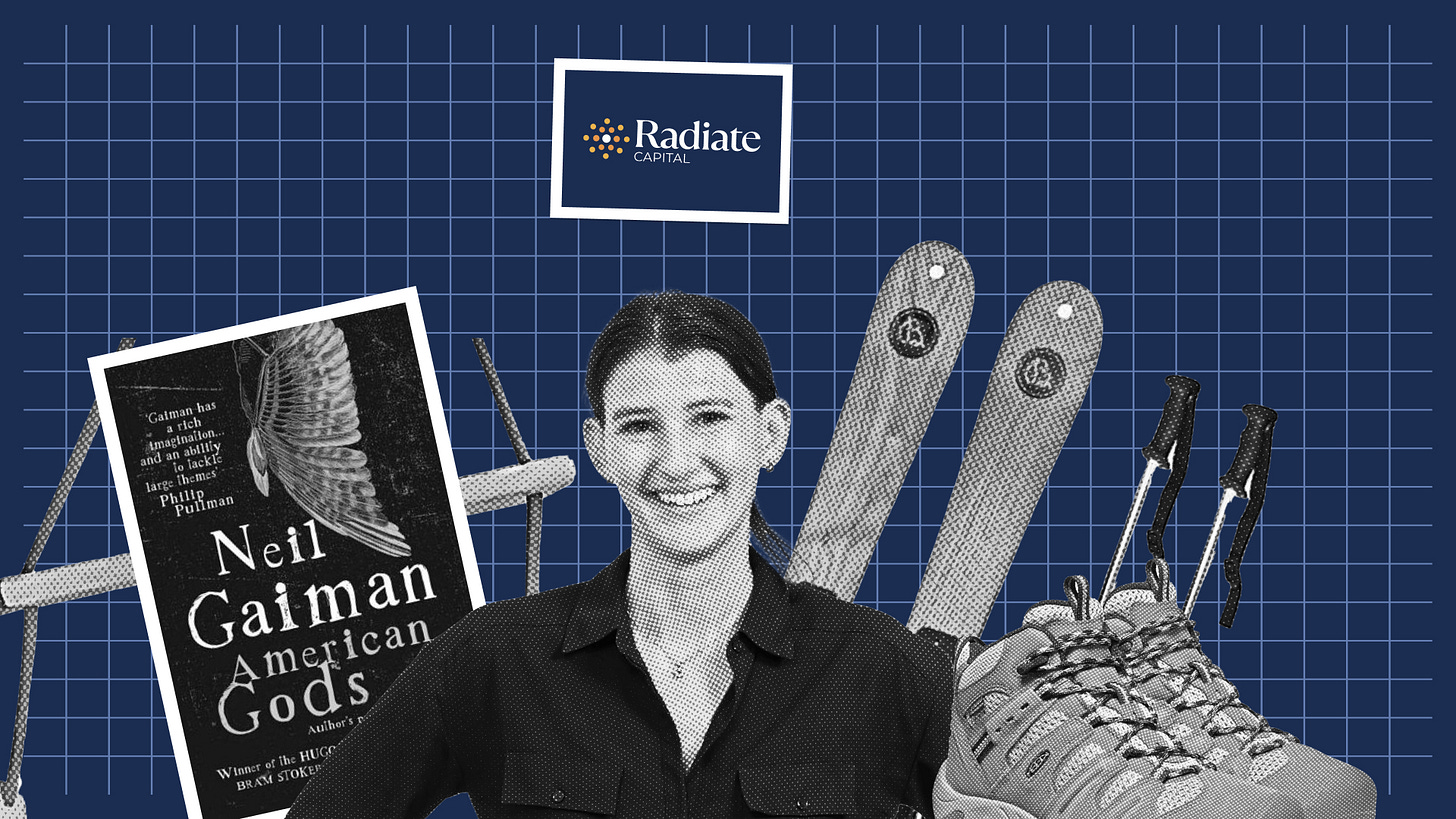Corinne Bortniker - Radiate Capital
"In venture as in life, your gut instinct is often your best assessment."
Connect with Corinne
https://www.linkedin.com/in/corinne-bortniker/
VC Uncovered's View
Corinne Bortniker approaches venture capital with the focused intensity that can only come from trapeze. She learned a vital lesson from her early training: when you are standing on the platform, ready to leap, hesitation means the moment passes. In venture, just as in the air, you must embrace risk, trust your preparation, and fly.
This willingness to leap, balanced with discipline and timing, defines the new breed of nimble, daring investors we champion at VC Uncovered. While the old guard often gets bogged down in analysis paralysis, Corinne acts with conviction. Instead of simply attaching herself to a legacy firm, she helped build Radiate Capital (the growth venture platform of Cohen Circle) from the ground up. This entrepreneurial approach immersed her in the mechanics of firm-building, cultivating in her the "roll-up-your-sleeves" ethos necessary to reshape the future of investing.
Radiate Capital, a women-led team, is dedicated to identifying health and financial services businesses that create a better tomorrow. They look beyond the standard metrics, applying a "double-lens" approach that demands compelling financial returns alongside measurable social impact for underserved communities. This commitment challenges a traditional VC playbook that often overlooks critical global issues.
Corinne’s philosophy emphasizes the development of intuition as an "informed signal.” While data is essential for building conviction, her decisions are ultimately driven by the founders themselves and the importance of the problems they're solving. She is selective with her time, focusing on forging deep, meaningful relationships that create long-term value. For Corinne, success in venture capital is measured not only by financial returns but also by the positive impact her companies create, which she helps magnify by connecting them with the right partners.Meet Corinne
Q: You can be anywhere. Eating, drinking, and reading your favorite thing. What is it?
A: I’d be sitting by the fire after spending the day hiking or skiing, with a glass of wine reading American Gods by Neil Gaiman.
Key Quotes
"In venture, hesitation often means missing an opportunity. The trapeze taught me to embrace risk, lean into the unknown, and trust my preparation."
"I see intuition and data as inseparable. The analysis helps build conviction, but intuition guides where to dig, when to push, and when to lean in."
"We’re especially drawn to founders who have been battle-tested - those who have faced obstacles, pivoted, or rebuilt, emerging with sharper insights and stronger companies."
"Time is a luxury, and how we spend it shapes the quality of our work and relationships."
"Distribution, not product, is often what separates momentum from mediocrity."
Original Responses (Lightly Edited for Clarity and Flow)
Background and Personal Journey
Experiences Shaping My Investment Approach
As a teen, I spent several summers at a performing arts camp, training in aerial circus acts, mostly trapeze. One year I focused on flying trapeze, and the experience gave me a framework that still shapes how I approach life and investing.
For those unfamiliar, flying trapeze begins with climbing an impossibly tall ladder to a tiny platform. You’re clipped into a harness, handed the bar, and asked to lean forward over the edge. You steady your gaze forward, wait for the signal, and then leap. If you hesitate, the moment passes. If you trust your preparation, you fly.
That training has stayed with me. In venture, hesitation often means missing an opportunity. The trapeze taught me to embrace risk, lean into the unknown, and trust my preparation. Each investment is still a leap, part discipline, part timing, part faith, but each one builds the confidence to reach for bigger challenges.
Balancing Intuition with Data
Over the years, I’ve had many conversations with my mom where she’s helped me navigate whatever I’m facing. In those moments, she would often say, tongue in cheek, “in literature as in life.” But there was always validity there. So, I borrow it to say: “in venture as in life”, your gut instinct is often your best assessment. If your mind is whispering that there’s something here, it’s important to listen.
Early on, I learned that trusting intuition was a skill to be developed alongside analysis. That’s where this career became fun for me, because it pushed me to go deeper in our focus sectors, to build a knowledge base and pattern recognition strong enough that my intuition wasn’t a guess, but an informed signal.
Today, I see intuition and data as inseparable. The analysis helps build conviction, but intuition guides where to dig, when to push, and when to lean in.
Moment Inspiring Venture Career
I feel fortunate about the way I entered venture. After several years in investment banking, I was exploring my next step when a mentor encouraged me to meet Betsy Cohen. At the time, Cohen Circle did not have a venture strategy, but their reputation in fintech was unmatched. The advice I heard consistently was clear: if you have the chance to learn from Betsy, you take it. When I joined, we immediately set to work on building what is now Cohen Circle’s growth venture platform, Radiate Capital. It was a rare opportunity to help shape a new fund from the ground up: developing investment theses, constructing a portfolio, and learning the mechanics of firm-building in real time. That experience didn’t just introduce me to venture, it immersed me in the strategic and operational foundations of building a fund. It gave me both a deep respect for the craft of investing and conviction in the disciplined, long-term approach that guides Radiate today.
Philosophy and Insights
Investment Philosophy
I’d describe my investment philosophy as the quantitative should support the qualitative.
Depending on the stage of a startup, you’re making investment decisions with varying amounts of data. So how do you decide whether to invest? For me, it starts with belief, formed from both qualitative and quantitative reasoning.
The first lens is always the founder(s): how they articulate the problem, and why they’re the ones to solve it. I assess the people and the problem first, then build from there. While building out that qualitative view, I lean on both company-provided information and my own research to construct a quantitative assessment.
For me, a “yes” requires alignment: the numbers must support the conviction built from the qualitative side. Put simply, data sharpens conviction, but it’s the people and the problem that guide it.
Approach to Risk
Risk is necessary but calculated. Backing exceptional founders often means leaning into the unknown, but with discipline and conviction. At Radiate, we aim to invest in companies and teams that can deliver both financial and social returns, while acknowledging that innovation inherently comes with risk.
Our process often leads us toward startups tackling white spaces. These teams are carving their own paths, which requires us to have an appetite for risk. But our approach is balanced: significant behind-the-scenes diligence, paired with the deep operating knowledge of our team and network, helps us identify the right opportunities.
We’re especially drawn to founders who have been battle-tested, those who have faced obstacles, pivoted, or rebuilt, emerging with sharper insights and stronger companies. Our conviction comes from knowing a team can adapt quickly to its environment, which is ultimately how we get comfortable partnering with founders tackling new challenges with bold, innovative solutions.
Measuring Success Beyond Returns
At Radiate, we apply a double-lens approach to investing that goes beyond financial outcomes. First, we back health and financial services businesses improving affordability, accessibility, and scalability for underserved communities. These companies generate measurable social outcomes for their end users, and we partner with them to develop KPIs that capture and showcase this impact.
Our second lens is selectivity around where we know we can add meaningful, strategic value. That can take many forms, introductions, reshaping a narrative, or providing targeted strategic insights, but the goal is the same: to increase the likelihood of success.
For me, success is measured not only by financial returns, but by how much faster and further a company can grow because of our partnership, and how that growth amplifies both financial returns and social impact.
Trends and Future Vision
Exciting Trends and Technologies
One of the most exciting trends ahead is AI, not just as a tool for efficiency, but as a catalyst for equity. AI has the potential to rewire how we deliver healthcare and financial services: two systems that define quality of life and economic mobility.
In healthcare, AI can expand access to preventive and lower-cost care by enabling earlier detection, monitoring, and more patient-specific solutions.
In financial services, AI can widen inclusion by automating savings, improving budgeting, and extending affordable advice and capital access to households and small businesses.
Real potential lies at the intersection of health and wealth. AI, thoughtfully designed and deployed, can break cycles of insecurity and build more inclusive systems for the future.
Challenges for Early-Stage Founders
The hardest challenge early-stage founders face today isn’t building a product, it’s breaking through. With AI lowering barriers to development, it has never been easier to get a product off the ground. What’s harder is cutting through crowded markets to reach customers, win mindshare, and build durable distribution.
VCs can play a critical role here. Beyond capital, we can help founders access networks that accelerate go-to-market, whether that’s first customers, strategic partners, or key hires who know how to scale. The best support isn’t just writing a check; it’s opening doors and offering leverage that helps founders punch above their weight. Distribution, not product, is often what separates momentum from mediocrity.
Improving the VC Ecosystem
If I could improve one aspect of the venture capital ecosystem, it would be how we approach connectivity. Too often, time is treated like a commodity measured in back-to-back meetings, inbox volume, or transactional introductions. In reality, time is a luxury, and how we spend it shapes the quality of our work and relationships.
I believe we should normalize intentionality: investing our energy in conversations that inspire, provide mentorship, build camaraderie, or truly move the needle. That means being generous with time when there’s alignment, and equally comfortable saying no when there isn’t. Clearer boundaries not only protect focus, but also create space for the kinds of deep, meaningful interactions that drive long-term impact.
Venture is, at its best, about people: founders, LPs, and peers who challenge and support each other. By creating space to invest in the right problems with the right people, we can fuel breakthrough innovation and rapid change.









